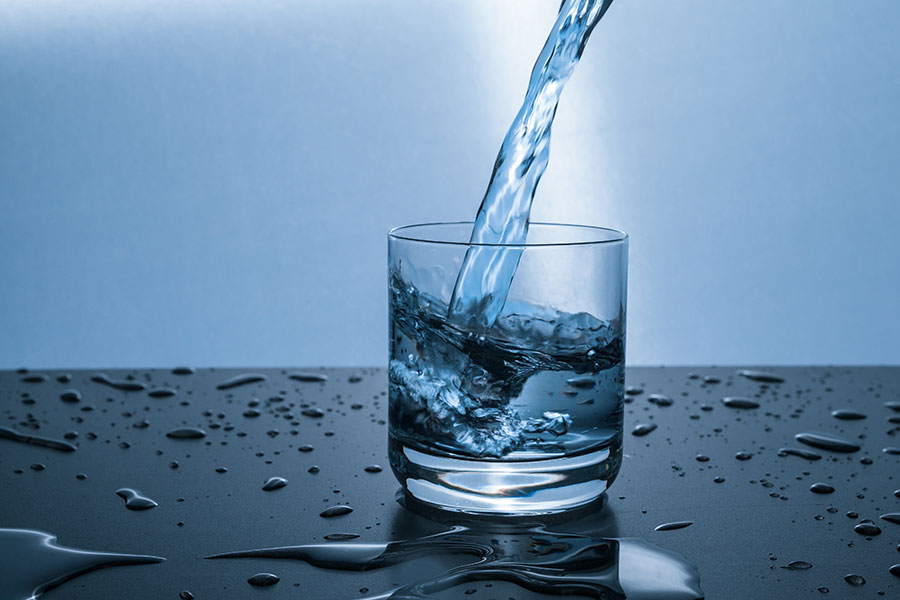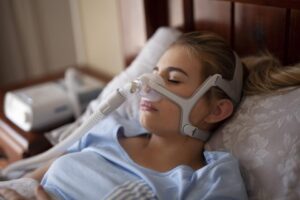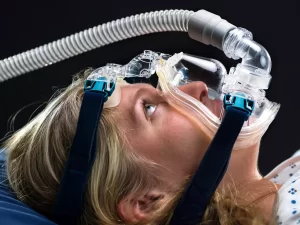Have you ever wondered if you can use purified water in your CPAP machine? Many people who suffer from sleep apnea and other sleep disorders rely on a CPAP machine to help them get a restful night’s sleep. But many of them are unsure about what kind of water they should be using with their machine. In this article, we’ll take a look at whether or not you can use purified water in your CPAP machine and all the considerations that come along with it.
Table of Contents
Do you have a hard time sleeping at night? If so, chances are that you’ve looked into purchasing a CPAP machine. A CPAP (Continuous Positive Airway Pressure) machine is used to treat sleep apnea and other breathing-related sleeping problems by providing a constant stream of air pressure through a mask that is worn over the nose and mouth while sleeping. But when it comes to filling up your CPAP machine with water, many people aren’t sure what kind of water to use.
So, can you use purified water in a CPAP machine? The answer is yes! Purified water has been shown to be safe to use in most types of CPAP machines. However, there are some important things to keep in mind before making the switch to purified water. In this article, we’ll explore why it’s safe to use purified water in your CPAP machine and some tips for ensuring its proper use.
Definition Of Purified Water
Purified water is any type of water that has been processed to remove impurities, contaminants and other undesired elements. It can come in many forms, including distilled water, deionized water and reverse osmosis (RO) water. Distilled and purified waters are free of minerals and bacteria, while RO water still contains some trace mineral ions and other dissolved solids. All types of purified water are safe for human consumption.
The process of purifying water usually involves a combination of filtration, chemical treatment and distillation. The most common type is reverse osmosis water, which passes through a semi-permeable membrane to remove sediment, chemicals and other impurities. Other methods used to purify water include chemical treatments like chlorination or ozonation as well as physical processes such as filtering or boiling the water.
When considering whether to use purified water in a CPAP machine, it’s important to note that different manufacturers have different recommendations for their machines. Some may require distilled or filtered tap water while others may recommend using only bottled or RO-treated waters. It’s important to read the instructions carefully before filling your CPAP machine with any type of purified water.
Benefits Of Using Purified Water In A Cpap Machine
Using purified water in a CPAP machine has many benefits. It helps to ensure that the machine is properly maintained, and it prevents the buildup of contaminants and bacteria that could potentially cause health problems for the user. The most important benefit of using purified water is that it helps to keep the airway clear from any particles or debris that could hinder breathing. This is especially important for those who suffer from sleep apnea, since they need to have a clear airway in order to effectively use their CPAP machine.
In addition, purified water can help to reduce the amount of mineral deposits that can accumulate on the surface of your CPAP mask and tubing over time. These mineral deposits can be quite difficult to remove if allowed to build up, so regularly replacing your water reservoir with purified water can help to reduce this problem significantly. Finally, using purified water in a CPAP machine also helps to improve its overall performance, ensuring that you get maximum benefit from your therapy every night you use it.
By using purified water rather than tap or distilled water when filling your CPAP machine’s reservoir, you’ll be able to enjoy better performance and improved respiratory health without having to worry about harmful contaminants or mineral deposits affecting your equipment or therapy.
Types Of Water Filters For Cpap Machines
Using purified water in a CPAP machine can lead to numerous health benefits. But it is important to ensure that the correct type of filter is used to get the best results. There are three main types of water filters for CPAP machines: activated carbon, reverse osmosis, and distillation.
Activated carbon filters are the most common type of CPAP filter, as they are relatively inexpensive and easy to install. These filters use activated charcoal or other carbon-based materials to absorb impurities from the water. This helps remove bacteria, sediment, chlorine, and other contaminants from the water before it enters the machine.
Reverse osmosis filters use a semi-permeable membrane to separate particles from the water and reduce contaminants such as fluoride, organic compounds, and heavy metals. Although they are more expensive than activated carbon filters, they tend to be more effective at removing impurities from the water supply.
Distillation filters use heat energy to evaporate and condense pure water away from contaminants such as viruses and bacteria. This ensures that all impurities are removed from your drinking water before it goes into your CPAP machine. While this method is typically very effective for eliminating contaminants, it can also be time-consuming and costly because of the amount of energy required for distillation.
No matter which type of filter you choose for your CPAP machine, make sure you follow manufacturer instructions closely so you get the best results possible out of your machine’s filtration system. Regularly changing out your filter will also help keep your CPAP running smoothly while ensuring that you get clean air every night while you sleep comfortably with your device on.
How To Set Up A Cpap Machine With Purified Water
Setting up a CPAP machine with purified water is easy and convenient. First, make sure to use distilled or purified water in the CPAP machine and not tap water. Tap water may contain too many minerals and other contaminants that can damage the internal components of the machine. To fill the tank, all you need to do is take off the lid of the tank and pour in the purified water. Make sure not to overfill it or else the machine may malfunction.
Next, attach the hose of your CPAP machine to the humidifier chamber. This is where warm air passes through and mixes with moisture from the humidifier chamber before entering your lungs. It’s important to ensure that there are no kinks in the hose as they can reduce airflow and cause issues with your sleep therapy. Once connected, open up both ends of your humidifier chamber so that air can flow through it without any obstruction.
Finally, start up your CPAP machine and allow it to run for a few minutes before using it for sleep therapy. This will give time for any remaining impurities in the water to evaporate so they don’t end up inside your lungs while you’re sleeping. With these simple steps, you can easily set up your CPAP machine with purified water and enjoy peaceful sleep every night!
Best Practices For Maintaining A Clean Cpap Machine
It is important to maintain a clean CPAP machine in order to ensure optimal performance and prevent the growth of bacteria or mold. To keep your CPAP machine running smoothly, there are a few best practices to follow.
First, it is essential to regularly clean your equipment with a gentle cloth and warm water. Be sure not to use any harsh chemicals or detergents as these can damage the machine. Additionally, avoid using tap water and instead opt for purified water when cleaning the CPAP device. This will help reduce the buildup of minerals or contaminants that can clog up the tubing and filters of the machine.
Another important practice is to replace your CPAP mask and tubing every three months or so. This will help prevent bacteria from growing in these components and ensure that you are breathing in clean air during sleep therapy sessions. Additionally, be sure to check the hose connection points on your mask for any signs of wear or tear as this could lead to leakage if left unchecked. Also, periodically inspect the machine itself for any visible signs of dirt or dust buildup and take appropriate steps to clean it up if necessary.
Maintaining a clean CPAP machine is an essential part of ensuring its proper functioning over time. Following these simple best practices will help guarantee that you always have access to safe and effective sleep therapy at home.
Potential Risks Of Using Non-Purified Water In A Cpap Machine
Using non-purified water in a CPAP machine can be very dangerous. The bacteria and contaminants present in non-purified water can cause respiratory infections and other health issues. The particles from the water can also clog the CPAP filter, causing the machine to malfunction. In addition, it can damage the internal components of the CPAP machine, reducing its effectiveness and lifespan.
When using non-purified water in a CPAP machine, there is always a risk of mold growth inside the tubing or humidifier chamber. This can lead to breathing in mold spores, which can cause allergic reactions and asthma attacks. Furthermore, if too much moisture builds up in the tubing, it could cause condensation to form on the inner walls of the tubing. This can lead to discomfort while sleeping as well as an increased risk of infection due to bacteria being present in stagnant water.
It is essential that only purified water is used when operating a CPAP machine. Not only will this reduce any potential risks associated with using contaminated water, but it will also extend the life of your machine by preventing any damage due to contaminants blocking or corroding its internal components. Regularly changing out your CPAP filter and cleaning your humidifier chamber are also important steps for ensuring optimal performance of your CPAP device. Taking these precautions will ensure that you receive all the benefits that your CPAP machine has to offer without exposing yourself to potential health risks from using contaminated water.
Cleaning & Disinfecting A Cpap Machine With Purified Water
Given the potential risks of using non-purified water in a CPAP machine, it is important to understand how to properly clean and disinfect a CPAP machine with purified water. To start, make sure to use only distilled or filtered water to fill the humidifier chamber. This will help ensure that no debris, chemicals, or minerals are present in the water that could potentially damage the machine’s components.
It is best to clean and disinfect the CPAP machine on a weekly basis. To do this, empty the humidifier chamber and rinse it with filtered or distilled water. Then spray down all exterior surfaces of the machine with an antimicrobial cleaner designed specifically for CPAP machines. Follow this by wiping down all surfaces with a soft lint-free cloth.
Once all surfaces have been cleaned and wiped down, refill the humidifier chamber with freshly filtered or distilled water and run it through a ‘Daily Cleaning’ cycle on your CPAP machine’s settings menu. Doing so will help ensure that any remaining bacteria or other contaminants are removed from the system before you use it again. Taking these steps can help keep your CPAP machine functioning optimally and reduce your risk of health complications caused by using contaminated waters.
Storing Purified Water In A Cpap Tank
Yes, you can use purified water in a CPAP machine. The purified water is free of impurities and contaminants that can affect the performance of the machine. Storing purified water in a CPAP tank is relatively easy and convenient, as all you need to do is fill up the tank with the right amount of purified water before use.
It’s important to ensure that only pure, distilled water goes into the CPAP tank. This means that tap water or other types of filtered water should not be used for this purpose. Distilled or deionized water will be best, as it has been stripped of all impurities and contaminants, making it an ideal option for your CPAP machine.
Before filling your CPAP tank with purified water, make sure to rinse out the tank thoroughly in order to remove any dust or dirt particles that may have accumulated over time. Also, when storing the CPAP tank filled with purfied water, keep it away from direct sunlight and other sources of heat so as not to encourage bacteria growth. Additionally, check on your CPAP machine regularly to ensure that there are no leaks or blockages in the system that could potentially cause damage to the device.
Storing purified water in a CPAP tank will help keep your device clean and functioning efficiently over time. It’s important to pay attention to any signs of wear and tear on the parts of your machine so you can make sure it remains in optimal condition for many years to come.
Troubleshooting Tips For Using Purified Water In A Cpap Machine
Using purified water in a CPAP machine is an important part of ensuring that it runs properly and efficiently. However, there are some tips you should keep in mind when using purified water. First, always use the correct filter for your CPAP machine. Not all filters are designed to work with purified water, so be sure to check with your manufacturer before purchasing one. Second, make sure to change the filter regularly as recommended by your manufacturer. A dirty filter can cause clogs and other problems which could lead to decreased performance of your CPAP machine. Finally, if you experience any problems while using purified water in your CPAP machine, contact customer service or a certified technician for help. They can quickly diagnose and repair any issues that may arise from using purified water in your machine.
Alternatives To Using Purified Water
Some people may be hesitant to use purified water in their CPAP machine due to cost or availability. Thankfully, there are alternative options for CPAP users. Tap water is an option that many people use in their machines, however it should be noted that this may increase the risk of bacteria and mold build up due to mineral deposits left behind by the tap water. To reduce the risk of using tap water, distilled water is a better choice as it has been boiled and evaporated to remove most impurities.
Another option is reverse osmosis water, which goes through a filtration process that removes contaminants from the source water. This type of water is often used in aquariums and can also be used in a CPAP machine without worry. It’s important to note that while reverse osmosis water may be more expensive than distilled or tap water, it could potentially save money in the long run as it reduces the need for frequent cleaning and maintenance of your CPAP machine.
It’s important for CPAP users to consider their options when determining what type of water to use in their machine. While purified water may be ideal due to its ability to reduce bacteria and mold growth, there are several alternatives available that still offer a safe and effective way to keep your CPAP running smoothly.
Frequently Asked Questions
What Is The Best Type Of Water Filter To Use In A Cpap Machine?
When it comes to using a CPAP machine, finding the right type of water filter is essential for ensuring a comfortable sleep. The water filter you choose will depend on your individual needs and preferences as well as the quality of your tap water. It’s important to note that not all types of filters are suitable for use in CPAP machines, so it’s important to do your research before making a purchase.
When choosing a water filter for a CPAP machine, one option is an ultrafiltration system. This type of filtration works by removing contaminants from the water while still allowing beneficial minerals and other substances to remain in the water. Ultrafiltration systems are also effective at preventing bacteria growth in the CPAP tubing, which can cause respiratory issues and other problems. They are easy to install and maintain, making them an ideal choice for many users.
Another option is reverse osmosis filtration, which is a more advanced form of filtration that removes up to 99% of impurities from the water. It also removes minerals such as calcium and magnesium that can clog up your CPAP tubing over time. Reverse osmosis systems are usually more expensive than ultrafiltration systems but provide higher levels of purification for those who need it.
No matter which type of filtration system you choose, it’s important to make sure you replace or clean the filter regularly according to manufacturer instructions in order to keep your CPAP machine running smoothly and effectively. Maintenance is key when it comes to getting the most out of your CPAP machine so taking care with your chosen filter will ensure you get maximum benefit from its use.
How Often Should I Clean And Disinfect My Cpap Machine With Purified Water?
Maintaining the cleanliness of your CPAP machine is essential for proper functioning. Cleaning and disinfecting it with purified water is an important part of this maintenance. It’s important to know how often to carry out this task in order to keep the machine running well.
When cleaning and disinfecting your CPAP machine, use only purified water. Regular tap water may contain minerals that can leave deposits on the device and its accessories, which can cause damage over time. Additionally, any bacteria or other microorganisms in regular tap water can be potentially harmful when inhaled through a CPAP mask, so it’s best to err on the side of caution and use purified water instead.
So how often should you clean and disinfect your CPAP machine with purified water? The answer depends on what type of humidifier you are using. If you have a heated humidifier, you should replace the tank’s water daily and do a thorough cleaning with soap and warm water at least once a month. For non-heated humidifiers, replace the tank’s water daily and clean it with soap and warm water once every two weeks. No matter which type of humidifier you have, make sure to rinse all components thoroughly before reassembling them for use.
Cleaning your CPAP machine regularly is an essential part of keeping it in good working order for years to come. Remember, always use purified water when cleaning and disinfecting your device and follow manufacturer instructions for optimal results. Taking these steps will help ensure that your CPAP machine remains safe and effective for many nights of restful sleep ahead!
What Is The Maximum Amount Of Purified Water I Can Safely Store In The Cpap Tank?
When it comes to CPAP machines, it is important to know the maximum amount of purified water that can safely be stored in the tank. This is because too much water in the tank can lead to problems with the machine, including clogs and oversaturation of the air filter. Additionally, storing too much water can cause bacteria and other contaminants to build up in the tank, which can make breathing difficult for those using a CPAP machine.
It is recommended that users only store enough purified water in their CPAP tanks to last one or two days. This will help ensure that no bacteria has time to grow and contaminate the water supply. Additionally, it is important to periodically clean and disinfect the machine with fresh purified water according to manufacturer instructions. Proper cleaning will also help keep any buildup from occurring inside the tank, which could reduce the effectiveness of your CPAP treatment.
Finally, it is important to never add more than two liters of purified water into your CPAP tank at once as this could put unnecessary strain on your machine’s components. Additionally, when refilling your tank with new water, be sure not to use tap or distilled water as these contain impurities which may damage your machine over time. Instead, opt for filtered or reverse osmosis treated water as these are best suited for use in a CPAP machine.
By following these guidelines on how much purified water should be stored in a CPAP tank and how often it needs to be replaced or cleaned, you can greatly reduce any chances of contamination and ensure you receive optimal benefits from your CPAP treatment.
What Are The Potential Benefits Of Using A Cpap Machine With Non-Purified Water?
Using a CPAP machine with non-purified water can have a range of potential benefits. It’s important to understand the implications of this choice, as it could be beneficial for certain users and detrimental for others. In this article, let’s explore the potential benefits of using a CPAP machine with non-purified water.
One benefit is that you can save money by avoiding buying purified water. Tap or bottled water are both much more cost effective than purchasing purified water specifically designed for use in CPAP machines. This could make CPAP therapy much more accessible to those who don’t have the financial means to purchase purified water on an ongoing basis.
Another potential benefit is that it may be easier to store and transport tap or bottled water than it is to stock up on large quantities of purified water if you plan to travel with your CPAP machine. Purified water can also expire over time when stored in tanks, so opting for tap or bottled water reduces the risk of having any issues with expired liquid inside your tank.
Finally, using non-purified water may reduce build-up from minerals and other substances that accumulate in the tank over time when using purified water exclusively. This build-up can create blockages and make cleaning the tank much more difficult, so opting for non-purified options can help maintain optimal functionality of your CPAP machine longer than if you used only purified liquid exclusively.
It’s important to consider all factors before making a decision about whether non-purified liquids are right for you and your CPAP machine. As always, consult with your doctor or other medical professional before making any changes to your current routine or treatment plan.
Are There Any Alternatives To Using Purified Water In A Cpap Machine?
Using purified water in a CPAP machine is often seen as the most effective way to keep the device clean and functioning properly. However, there may be times when another alternative is needed or desired. Are there any alternatives to using purified water in a CPAP machine?
The most obvious alternative is to use distilled water. Distilled water has been boiled and condensed, resulting in a form of pure water that some people find more comfortable than using purified water. Distilled water also contains fewer minerals than purified water, so it may not have the same residue build-up as purified water over time. Additionally, distilled water can be purchased easily at many grocery stores and pharmacies.
Another option could be to use bottled spring or mineral water instead of purified or distilled. Spring and mineral waters are naturally filtered through the Earth’s crust, so they contain varying amounts of minerals that some people may find beneficial for their CPAP devices. These types of waters are relatively easy to obtain from most stores and can be reasonably priced depending on what type is chosen.
It’s important to note that these alternative waters should still be tested for safety before being used in a CPAP machine as many bottled waters contain high levels of chlorine or other chemicals which could damage the device if it’s not filtered out properly beforehand. Ultimately, it’s up to an individual user to determine what type of water will work best for them and their CPAP machine needs.
Conclusion
In conclusion, it’s important to understand that using purified water in a CPAP machine is an important part of the overall maintenance procedure. It ensures that the machine will provide clean and safe air for users. As such, you should always make sure to use the right type of filter and regularly change it out as needed. Additionally, you should never store more than the recommended amount of purified water in the CPAP tank, as this could result in contamination or damage to the unit.
At the same time, it’s also important to recognize that there are potential benefits to using non-purified water in a CPAP machine as well. It may be useful for those who don’t have access to filtered water or who want to reduce their environmental impact by avoiding single-use plastic containers. Ultimately, it’s up to you to decide whether purified or non-purified water is best for your needs.
No matter which type of water you choose for your CPAP machine, regular cleaning and disinfection is essential for optimal performance and user safety. By following these tips and investing in a high-quality filter, you can ensure that your CPAP machine operates effectively and safely with whatever type of water you choose.





[…] Tap water is not a good idea to use in your CPAP, even for a night. If you don’t have distilled water available, either boil and then cool down the tap water or use bottled water […]